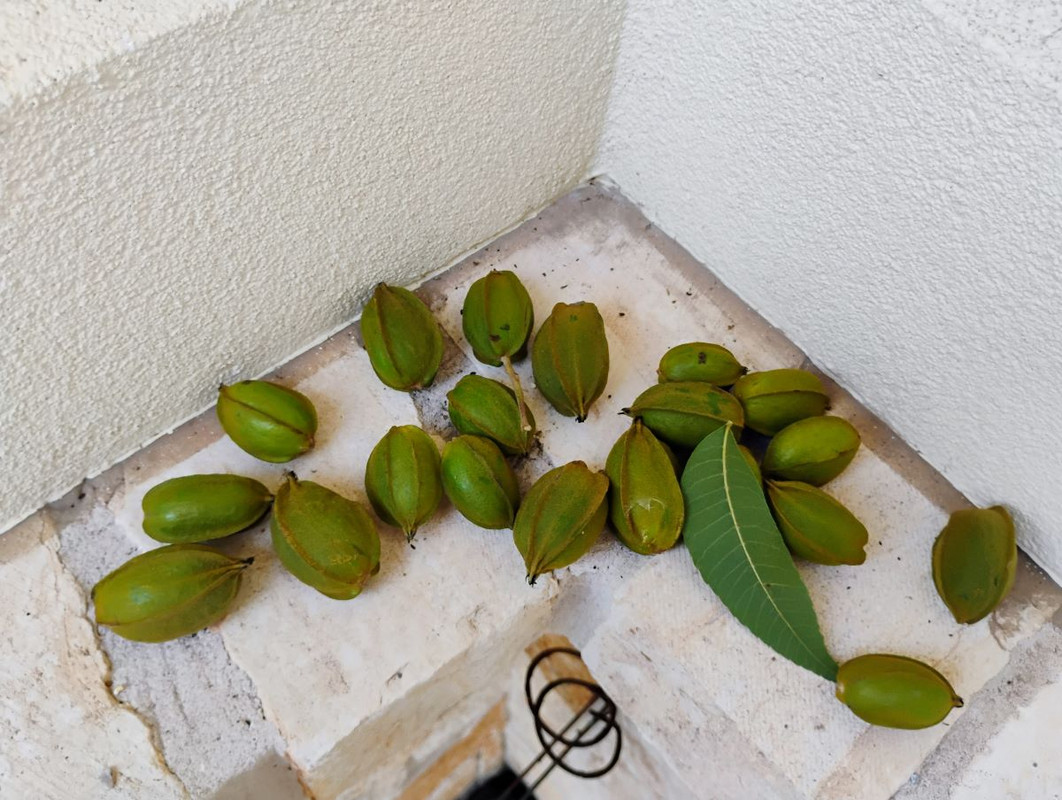
怎么防止 松鼠吃 pecan,家里有个pecan树, 结很多果,但从来没吃到过,
版主: QIANSHUIBA, F150
-
cellcycle1楼主
- 论坛元老

cellcycle1 的博客 - 帖子互动: 887
- 帖子: 65796
- 注册时间: 2022年 7月 24日 15:59
#2 Re: 怎么防止 松鼠吃 pecan,家里有个pecan树, 结很多果,但从来没吃到过,
松鼠很难防,它们爬树和高空跳跃的高手,而且坚果是松鼠的最爱。
但是,如果自己用心防,肯下功夫肯花钱(时间、精力、设备等),还是能防住的。能吃到自家树结的坚果,自我感觉还是很不错的。
但是,如果自己用心防,肯下功夫肯花钱(时间、精力、设备等),还是能防住的。能吃到自家树结的坚果,自我感觉还是很不错的。
持仓抄底锁利,你钱你定
看牛观猪喊熊,自娱自乐
股市变幻莫测,不作不死
赌途曲折无常,吃枣药丸
看牛观猪喊熊,自娱自乐
股市变幻莫测,不作不死
赌途曲折无常,吃枣药丸
#3 Re: 怎么防止 松鼠吃 pecan,家里有个pecan树, 结很多果,但从来没吃到过,
To deter squirrels from eating pecans, try using physical barriers like metal flashing around the tree trunk or netting over branches. You can also use scent deterrents like hot pepper spray or mothballs, or create a distraction with a bird bath or deer antlers placed near the tree. [1, 2, 3, 4, 5]
Here's a more detailed breakdown of methods:
Physical Barriers:
• Metal flashing: Wrap a wide (2-foot) band of sheet metal around the tree trunk to prevent squirrels from climbing up. Ensure it's securely fastened and extends far enough to deter jumping from nearby branches. [1, 6, 7]
• Netting: Cover branches with netting to prevent squirrels from reaching the pecans. Consider using a mesh material that allows air circulation and sunlight. [8, 9, 10]
Scent Deterrents:
• Hot pepper spray: Create a spray with capsaicin (the active ingredient in hot peppers) and apply it to the tree trunk, branches, and the ground around the tree. [4, 11]
• Mothballs: Place mothballs in mesh bags and hang them in the tree. Be mindful of the strong odor and potential harm to other wildlife. [2, 4]
• Other scents: Some gardeners report success with coffee grounds, peppermint oil, or predator urine sprays. [3, 12]
Other Methods:
• Distraction: Provide a bird bath or a designated area with food to divert squirrels from your pecan tree. [5]
• Deer Antlers: Attaching deer antlers to the tree can provide a gnawing alternative for squirrels. [5]
• Trapping: If the problem is severe, humane trapping and relocation of squirrels can be an option, but be aware that new squirrels may move in. [1, 13]
• Cleanliness: Keep the area around the tree clear of fallen pecans and other debris to reduce the attractiveness of the area for squirrels. [14]
AI responses may include mistakes.
[1] https://www.chron.com/life/gardening/ar ... 977523.php
[2] https://www.quora.com/How-do-pecan-farm ... ir-harvest
[3] https://cooke.agrilife.org/files/2018/0 ... irrels.pdf
[4] https://www.weekand.com/home-garden/art ... 035460.php
[5] https://austintreeamigos.com/prevent-sq ... w-whats-up
[6]
[7] https://www.mcall.com/2019/02/14/keepin ... ers-bulbs/
[8]
[9]
[10] https://www.ysnetting.com/how-to-keep-s ... -tomatoes/
[11] https://ozarkchinquapinmembership.org/h ... m-animals/
[12] https://treenewal.com/how-to-get-rid-of ... -humanely/
[13] https://www.houzz.com/discussions/17167 ... our-pecans
[14]
Here's a more detailed breakdown of methods:
Physical Barriers:
• Metal flashing: Wrap a wide (2-foot) band of sheet metal around the tree trunk to prevent squirrels from climbing up. Ensure it's securely fastened and extends far enough to deter jumping from nearby branches. [1, 6, 7]
• Netting: Cover branches with netting to prevent squirrels from reaching the pecans. Consider using a mesh material that allows air circulation and sunlight. [8, 9, 10]
Scent Deterrents:
• Hot pepper spray: Create a spray with capsaicin (the active ingredient in hot peppers) and apply it to the tree trunk, branches, and the ground around the tree. [4, 11]
• Mothballs: Place mothballs in mesh bags and hang them in the tree. Be mindful of the strong odor and potential harm to other wildlife. [2, 4]
• Other scents: Some gardeners report success with coffee grounds, peppermint oil, or predator urine sprays. [3, 12]
Other Methods:
• Distraction: Provide a bird bath or a designated area with food to divert squirrels from your pecan tree. [5]
• Deer Antlers: Attaching deer antlers to the tree can provide a gnawing alternative for squirrels. [5]
• Trapping: If the problem is severe, humane trapping and relocation of squirrels can be an option, but be aware that new squirrels may move in. [1, 13]
• Cleanliness: Keep the area around the tree clear of fallen pecans and other debris to reduce the attractiveness of the area for squirrels. [14]
AI responses may include mistakes.
[1] https://www.chron.com/life/gardening/ar ... 977523.php
[2] https://www.quora.com/How-do-pecan-farm ... ir-harvest
[3] https://cooke.agrilife.org/files/2018/0 ... irrels.pdf
[4] https://www.weekand.com/home-garden/art ... 035460.php
[5] https://austintreeamigos.com/prevent-sq ... w-whats-up
[6]
[7] https://www.mcall.com/2019/02/14/keepin ... ers-bulbs/
[8]
[9]
[10] https://www.ysnetting.com/how-to-keep-s ... -tomatoes/
[11] https://ozarkchinquapinmembership.org/h ... m-animals/
[12] https://treenewal.com/how-to-get-rid-of ... -humanely/
[13] https://www.houzz.com/discussions/17167 ... our-pecans
[14]
持仓抄底锁利,你钱你定
看牛观猪喊熊,自娱自乐
股市变幻莫测,不作不死
赌途曲折无常,吃枣药丸
看牛观猪喊熊,自娱自乐
股市变幻莫测,不作不死
赌途曲折无常,吃枣药丸
-
cellcycle1楼主
- 论坛元老

cellcycle1 的博客 - 帖子互动: 887
- 帖子: 65796
- 注册时间: 2022年 7月 24日 15:59
#5 Re: 怎么防止 松鼠吃 pecan,家里有个pecan树, 结很多果,但从来没吃到过,
养猫
投食把松鼠喂饱
据说管用但是不知道有多大用
投食把松鼠喂饱
据说管用但是不知道有多大用
---------
我欲乘机归去,又恐穷楼鬱府,高处不能酣
我欲乘机归去,又恐穷楼鬱府,高处不能酣

